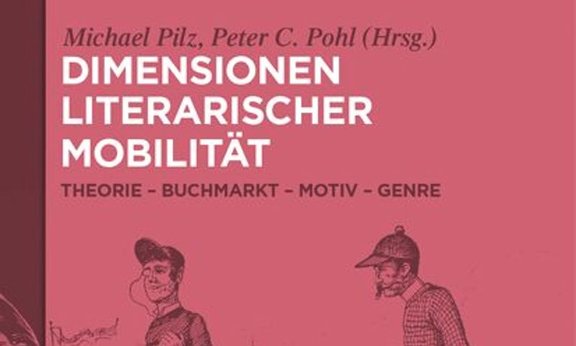Latest news
Blog

Fellowship ‘Constructed Spaces – Spatial Constructs’
[16.12.2025] In October 2025, the Research Area "Cultural Encounters – Cultural Conflicts" again offered a Fellowship for three international young researchers to work at the university of Innsbruck, this year's topic was 'Constructed Spaces - Spatial Constructs'.
Event tip

Guest Lecture: "Staatliches Versagen und aktive Zivilgesellschaft im Jahr 2015"
Time: Tuesday, December 16th, 2026, 5.15 pm - 6.45 pm
Place: Hörsaal 3, Innrain 52e, 6020 Innsbruck
Publications

Peter Pohl, Michael Pilz: Dimensionen literarischer Mobilität
Im vorliegenden Band beleuchten namhafte Autorinnen und Autoren vier Dimensionen literarischer Mobilität: Literaturtheorie, Buchmarkt, Mobilität als Motiv und in einschlägigen Genres (wie der Reiseliteratur).
FSP planning calendar
Call: FSP Fellowship Host 2026
Nov. 25 - Jan. 07, 2026
Call: FSP Lecture Series Host Summer 2027
Dec. 1 - Jan. 07, 2026
FSP board meeting
Jan. 20, 2026; 3.30 pm - 6.30 pm
FSP Klausurtag
Feb. 03, 2026; 9.00 am -13:30 pm
Research focus "Cultural Encounters - Cultural Conflicts"
The Research Area Cultural Encounters - Cultural Conflicts aims at researching social transformations and the challenges associated with them. In ten research centers, five doctoral colleges, and the Network of Areas, over 300 members are working on various aspects of cultural dynamics.
The Research Area thus forms the largest research network in the humanities, cultural studies, and social sciences in Western Austria.
Mission Statement
Our research is fundamentally dedicated to social transformations and their challenges. Mobility, migration, globalisation and cultural transfer, but also language, religion, digitality and socio-ecological sustainability are key topics of our time, which we investigate in aesthetic representations such as literature, art, music, films and media, but also in their everyday life and practices. We analyse cultural dynamics as spaces of creativity and the emergence of the new, but also of conflictual escalation, including war and violence. Like all cultural phenomena, they are historically conditioned and therefore multi-layered and changeable. They reflect power relations and social inequalities, while at the same time they are intertwined with the search for orientation and order.
The research fields of the FSP Cultural Encounters - Cultural Conflicts range from social transformations, migration, globalisation and different concepts of Europe to human-environment relations against the background of current and multiple crises. At the centre are questions of the creation of affiliations and distinctions, the constitution and abolition of borders, concretely in the social and abstractly in the symbolic. By interweaving historical and current, regional and global perspectives, the research focus forms a hub for interdisciplinary initiatives, research projects and networking within the university and beyond.
Communicating science (third mission) is a key task of the research centre. With the involvement of the urban and regional public, we work on current social and political issues and thus provide central impulses for a critical public dialogue. Through various formats and initiatives, we make research visible and tangible, thereby making an important contribution to strengthening trust in science.
We understand our research
- as a reflexive process that is not only interested in topics, but also considers the role of knowledge and science within them;
- as a collaboration between different specialist disciplines, each of which contributes its own expertise but learns from and relies on each other;
In 2015, the University of Innsbruck adopted a “Charter on Social Diversity”. It expresses a concern to which the Research Area has been committed for many years and which many of our activities take into account.

FSP Days
FSP days offer us the opportunity to examine broader topics from different disciplinary perspectives within the research focus area.
In conversation with ...
Science thrives on dialogue and discourse. This is why the research focus invites external academics and publicists to Innsbruck twice a year to engage in intensive dialogue with them.
Multilingualism colloquium
The colloquium "Multilingualism" offers the opportunity to continue the productive interdisciplinary discussion of the Research Day through the joint discussion of current articles on multilingualism research from various disciplines.
Open data sessions
Anyone involved in qualitative (social) research will be familiar with the need to share their own empirical data with other researchers during the research process. To this end, there is a regular opportunity for networking and specific data discussion for all those who work with oral interaction data and analyse it qualitatively.
FSP lecture series
Lecture series of the research focus "Cultural Encounters - Cultural Conflicts" on current topics.
Habilitation network meeting
The newly founded Innsbruck Habilitation Network aims to connect postdoctoral researchers at the University of Innsbruck beyond faculty structures.
FSP Fellowships
With the support of the International Relations Office, the Research Area invites up to three doctoral students or early postdocs to spend four weeks in Innsbruck to conduct their research here.
Research Initiative 'Research in sensitive fields'
The initiative “Researching in Sensitive Fields” brings together researchers from the University of Innsbruck who work in such fields. It offers the opportunity for interdisciplinary exchange on research content, methodological and ethical aspects, and experiences in everyday research.
Research Initiative 'Environmental Humanities'
The Environmental Humanities research initiative brings together researchers in this field with the aim of promoting exchange within the university, networking with other universities, and collaborating with non-university institutions.
Blog
Exciting contributions from the areas of "Young Research", "Academic Sidelights" and "Research Positions".
Publication Fund
Current calls for proposals
// No grants are currently being awarded. Calls for proposals are issued once a year, namely in November, for publications in the following calendar year. A further call for proposals per calendar year is possible depending on the availability of funds.
General funding guidelines
Funding is provided for the publication of monographs, anthologies and editions, in particular qualification publications (outstanding MA theses, dissertations and habilitation theses) that were written at the University of Innsbruck and will be published by the end of 2026. The FSP also supports fees for open access publication. The form required for this can be found here.
The printing costs will be subsidised with a grant of up to € 1,000, subject to available funds.
Award conditions and application documents
Funding is available for publication projects from the humanities, cultural and social sciences as well as from theological disciplines at the University of Innsbruck, which are initiated and supported by at least one member of the Research Area “Cultural Encounters - Cultural Conflicts” (information on FSP membership at fsp-kultur@uibk.ac.at). Research activities must have been assigned to the Research Area within the last five years.
The publication to be funded must be assigned to the Research Area in the University's database ("FLD"). If this is not possible, no funding can be awarded.
Qualification publications, publication projects with an interdisciplinary approach, projects with an open access strategy (green or gold) and publication projects that are subject to a peer review process are prioritized.
The completed and signed form and all required enclosures must be submitted. These are:
1. preliminary table of contents
2. for qualification publications: all reviews
3. a complete cost breakdown of the publication project (including an overview of other grants awarded or applied for)
4. Publisher's offer
Applications will be subject to expert review by the FSP Advisory Board.
Applications with the required enclosures in pdf format must be entered into the project database by the responsible project database officer of the respective institute. At the same time, please send your application by e-mail to fsp-kultur@uibk.ac.at.
The guidelines and information for the project database manager can be found at here
Event funding
Current calls for proposals
// There are currently no calls for event funding. Calls for proposals are issued twice a year, in October, for events taking place in the first half of the following year, and in April, for events taking place in the second half of the year.
General funding guidelines
The Research Area supports inter- or transdisciplinary projects that are located at the interface of two or more disciplines. Preference is given to projects that are supported by at least two members from different disciplines of the research focus, internationally visible projects, preparatory work for third-party funding applications and prospective networking activities within the research focus. Events should be held in Innsbruck or the surrounding area, otherwise a justification is required. Translation services and printing cannot be subsidised (please refer to the Publication Fund). Honary notes can only be subsidised in exceptional cases and for artistically active persons.
Please note that membership of the Research Area is a prerequisite for funding. Anyone who assigns their research achievements to the Research Area in the University's database ("FLD") is automatically a member (multiple credits are possible).
The required form can be found here.
The following are funded in connection with the research focus
- Workshops,
- Conferences/congresses (with external speakers),
- transfer- or application-orientated projects.
The following are not covered
- Scholarships,
- Research stays (please refer to the research grant),
- projects that have already been completed and
- activities with no recognisable connection to the research focus in terms of content or personnel.
Depending on the funds available, the amount of funding awarded is based on the criteria mentioned above. Funding for workshops and comparable activities amounts to a maximum of €800 and for conferences/congresses a maximum of €2,000. Applications must be accompanied by a detailed and comprehensible cost breakdown of the overall event.
There is no legal entitlement to funding. Grants awarded must be claimed by the beginning of December of each year; otherwise a new application must be submitted in the following year. If funding is awarded, we ask that reference be made to the Research Area, that Logo be used on printed materials and/or in digital formats and that the funded activity be assigned to the Research Area in the University's datebase ("FLD").
For the processing of approved funding, please refer to our Info Sheet.
Management & Coordination
Univ.-Prof. Dr. Silke Meyer
Head of the Research Area
+43 512 507-43351
silke.meyer[at]uibk.ac.at
Katherina Gruber
student assistant
csav7516[at]student.uibk.ac.at
Dr Teresa Millesi
Coordinator of the Research Area
+43 512 507-39820
teresa.millesi[at]uibk.ac.at
Advisory Board
University Professor Dr Birgit Mertz-Baumgartner
Associate Professor Dr Andreas Oberprantacher, MA
Associate Professor Dr Eva Pfanzelter
Dr Brigitte Rath
Associate Professor Dr Dietmar Regensburger
Associate Professor Dr Dirk Rose
Associate Professor Dr Dirk Rupnow
Associate Professor Dr Kurt Scharr
Associate Professor Dr Jörg Schwarz
ao. Associate Professor Dr Thomas Steppan
Associate Professor Dr Ulrike Tanzer
ao. Associate Professor Dr Andreas Vonach
Associate Prof. Dr Nikolaus Wandinger
Priv.Doz. Dr Ursula Schattner-Rieser
Assoc. Prof. Dr Rina Alluri
Dr Eva Binder
Associate Professor Dr Stefan Ehrenpreis
Assoc. Prof. Dr Andreas Exenberger
Priv.-Doz. Dr Christian Heitz
Associate Professor Dr Stefan Hofmann
ao. Professor Dr Julia Hörmann-Thurn and Taxis
Associate Prof. Dr Christine Konecny
